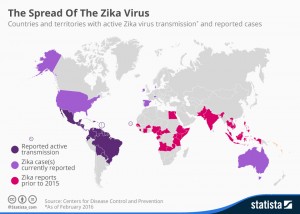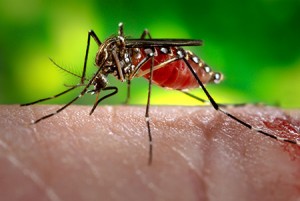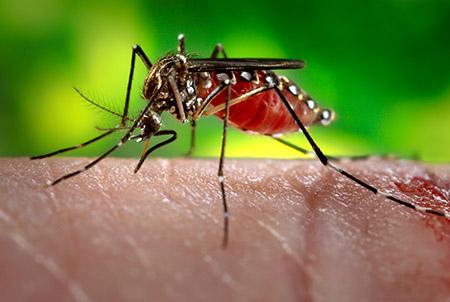Most people think that they will never catch a famously horrible disease, such as Malaria, Dengue Fever, or others like them. But very recently, a “new” disease has been popping up around the world, hidden and totally unsuspected. The Zika virus has made it’s way to the U.S. from various tropical regions around the world, especially Central and South America.

Photo by traveller24.news24.com
Many people may not know what the Zika virus does or how it is transmitted. To shed some light on the subject, the Zika virus is in the same family as the viruses that cause Dengue Fever, West Nile, and Yellow Fever. Zika Fever is actually fairly mild compared to its more deadly relatives, with no deaths. The symptoms of Zika Fever are mild headaches, a maculopapular rash, fever, malaise, conjunctivitis, and joint pains. In other words, it makes the recipient feel like they have the flu. But oddly enough, those who have contracted the virus don’t always develop symptoms, meaning that they have the virus and would never know.

Photo by www.medicinenet.com
There are only a few ways for Zika virus to be transmitted. The main mode of transmission is from only one family of mosquito, the Aedes family. Out of that family, the female Aedes aegypti mosquito is the biggest transmitter of the virus. All of these mosquitoes only feed, and therefore transmit the virus, during the day. Other than mosquitoes, people to people transmission of the virus is also possible, but only in a few ways. The first and foremost way of passing the virus from one person to another is through sex. If a man has the virus and has sexual activity with their significant other, they can pass the virus on. It is currently unknown whether or not a woman can give the virus to a man or if people of the same sex can give the virus to each other. The other mode of transmission from person to person would be through blood transfusions, but this is only theorized and has not been proven or tested as of right now.

Photo by www.livescience.com
So as high schoolers, we might wonder if the Zika virus will actually affect us in any serious way. In reality, the virus currently isn’t lethal, the mosquitoes that transmit it haven’t truly migrated to the continental U.S. yet, and most teenagers that have sex know to use contraceptives. As it is, people in high school are at relatively low risk of contracting the virus, and even if they do, the worst that happens is the mild Zika Fever. The one true danger of Zika is to pregnant women, or women trying to have a child. The virus, while not yet scientifically proven, is thought to be the cause of a severe increase of babies born with microcephaly, a condition in which the brain doesn’t develop properly, resulting in a smaller head, along with a multitude of health problems. But other than that, Zika is something that shouldn’t affect teenagers as much, but is still something to be concerned about and something to watch for.



















